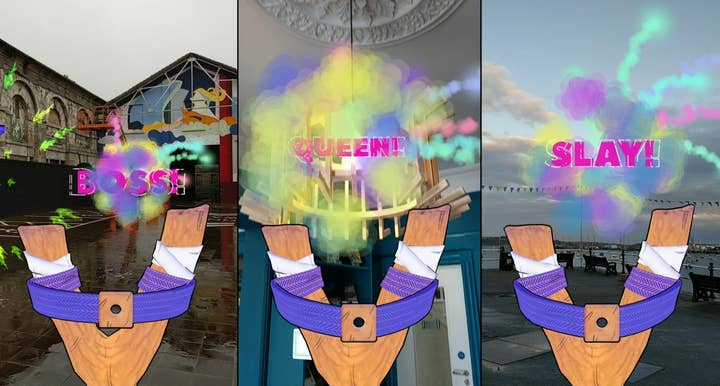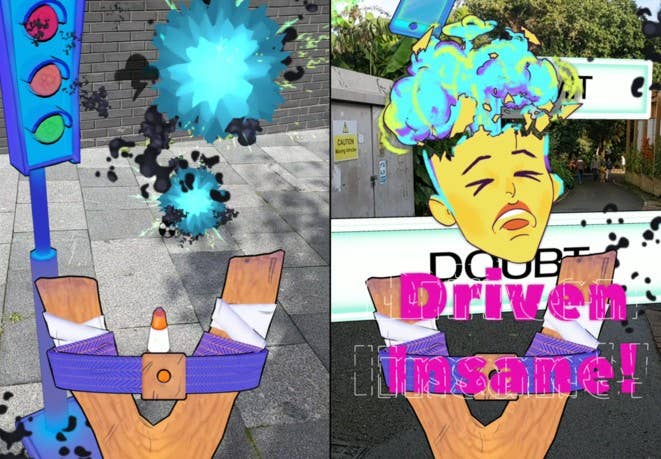Standing on the shoulders of Riot Grrrl: Story Juice and punk feminism in games
“When you can't see your stories and perspectives in an industry, then you have to put them there,” says studio founder Dr Hannah Wood
In one of her self-published zines, Tobi Vail -- a central figure in the '90s Riot Grrrl movement -- wrote: "I feel completely left out of the realm of everything that is so important to me. And I know this is partly because punk rock is for and by boys."
It's a sentiment that many women may recognise in gaming today: a multi-billion dollar, male-dominated industry in which vast corporations like Tencent, Ubisoft, EA, and a handful of others set the tone.
The Riot Grrrl movement was unapologetically feminist and effected lasting change in music culture. But the new brand of punk feminism it helped create has spread beyond music, and is now establishing roots in the games industry with studios like Story Juice.
"GamerGate and its toxic misogyny tells us there's a problem in the industry," says Dr Hannah Wood, founder of the Plymouth-based micro-studio. "Culturally we know there are problems with pay equality, care responsibilities, parental leave inequality, emotional labour, sexual harassment, the fact women are called bossy and not men, the glass ceiling where you don't have women in management roles...
"The representation of gender roles in the stories we tell is vital to our futures. It helps us to dream of what we can be"
"The representation of gender roles in the stories we tell is vital to our futures. It helps us to imagine and dream of what we can be. The things we see can turn into our realities and change the world. We can feel powerless against epic problems, but by putting new game stories into the world that explore its challenges and complexities, there's potential to change understandings about issues like gender. We might not shortcut to utopia, but we might nudge things along."
A former journalist, Wood did her PhD on storytelling in games and immersive theatre after becoming interested in the possibilities of digital storytelling. She now teaches part-time at Plymouth University, and runs Story Juice with the other half of her time doing client work in games and theatre, for example as Lead Writer on a current Audience of the Future project. Wood's ambition for Story Juice has grown over the last two years, becoming "invested in changing the narrative for women and diverse genders in games" with its two titles: The Glass Ceiling Games and Underland.
The games industry remains behind other creative industries in terms of gender equality, with women making up only 21% of the workforce, 11% in creative roles and fewer still in creative leadership positions. But Wood also notes that it's "also behind in content terms."

"Where is our version of [the TV series] I May Destroy You or Fleabag, or The Guilty Feminist podcast?," she says. "When I did a search for feminist games in the App and Google Play stores last year, I turned up wedding planner and women wrestling apps, and Reigns: Her Majesty -- a relevant game that did really well. It's not that there isn't feminist content; there is, and there are games I love, but it's a minority and in the indie space."
Wood notes that Riot Grrrl was criticised for racism, transphobia and classism, and says Story Juice is founded in ideas of intersectional punk feminism that considers gender, race, ability, age, sexuality, class, and other underrepresented voices when it comes to making games.
"Story Juice's feminism is intersectional, fifth wave and there with a capital F," says Wood. "Deborah Frances-White, who hosts The Guilty Feminist, said: 'It's not just about bringing hammers to smash things down, it's about bringing bricks to build the world we do want to live in.' That's where the punk part comes in, because it's a DIY culture. When you can't see your stories and perspectives in an industry, then you have to put them there."
The Glass Ceiling Games is pitched as a "punk album you can play," and Wood describes it as "The Olympics meets Buffy the Vampire Slayer."
"Each of the levels are symbolic of bigger cultural issues around gender pay gaps, parental leave inequality, sexual harassment, emotional labour, unconscious bias, gender stereotypes," she continues. "The music is central to the game's storytelling and aesthetic and the band Go Fallopian! -- who are these phenomenally talented musicians Anna Wheatley, Ben Hudson and Jimi Stewart -- was formed off the back of the project.
"When you can't see your stories and perspectives in an industry, then you have to put them there"
"I was heavily into the roller derby scene, which is another DIY culture that takes a lot of inspiration from Riot Grrrl, and that encouragement for women and girls to share their experiences by making art, music and zines, and celebrating creation rather than perfection or formal skill. I feel we're adding games into the line in the Riot Grrrl manifesto that says: Because us girls crave records and books and fanzines that speak to us that we feel included in and can understand in our own ways."
Wood, who takes great interest in how game mechanics interact -- or fail to interact -- with narrative, says the mechanics of The Glass Ceiling Games "come from our own experience, those of friends and people we've consulted with in the process of making it." Wood wants to explore how the combination of mechanics and story can open up people to other perspectives.
"It's about putting players in that perspective," she adds. "We're trying to do that with humour and to start conversation. And really the end of the game when you bring down the skyscraper symbol of a patriarchal world, it asks what you'll now build."

Wood continues: "Young men who played the first level of The Glass Ceiling Games at EGX said that when the catcalls became overwhelming at the end of the level they suddenly had a sense of what it might feel like to have that take up your headspace rather than being able to focus on your own wants and needs and future.
"I think through poetic mechanics there's potential to open up new understandings and new stories that resonate in ways different to other storytelling art forms because we also embody them through play."
In turn, Wood hopes to provoke conversation, debate, and make change by offering a "cathartic power fantasy. A chance to do things you might wish you could do in real life."
"I think sometimes you need to seize the power and distribute the benefits in new ways to change the narrative"
"There are ethical questions to consider about the player-shaped holes we create in game worlds," she adds. "Can they change how we think about issues like gender and help us create alternate and desired futures? I've had experiences where immersion in another reality has urged me to change my reality, or helped me discover forgotten or new parts of myself.
"I'm also interested in how games can give us representations that reflect who we really are so we can throw off the weight of false gender expectations, stereotypes, and culturally constructed roles. Feminism helps everyone."
There is a potential conflict at the heart of Story Juice, however, as its punk feminist philosophy bristles against the corporate world of games. Story Juice is "standing on the shoulders of Riot Grrrl," which was a staunchly anti-capitalist movement, so how does Wood reconcile that conflict between the punk ethos, but operating in the big-money games industry?
"The response to that question is really about reinvestment of any profit in future work, in our values, in helping others with similar missions, in allied causes and in alternative models of working," she says.
Wood takes inspiration from Hello Sunshine, actor Reese Witherspoon's business focused on centering women's stories; and other companies where there are flatter hierarchies or employees own shares, but recognises there is still a lot more growing to do first.
"We're not at either of those stages yet. Right now we need investment to get the games completed. We've had some financial support from the UK Games Fund, Creative England and South West Creative Technology Network and are also self-funding using client work. It's a difficult question because game making requires money to get things made, pay people so they can live. Artists and people in the creative industries, myself included, can often be exploited, asked to work for free or for 'exposure', which is an outrage.
"I think sometimes you need to seize the power and distribute the benefits in new ways to change the narrative. Sometimes you have to reinvent the structures, and other times -- inspired by [a speech by American activist] Mario Savio -- you have to put your body on the levers and make the machine stop."
In March, Story Juice received £25,000 in UKGF funding for The Glass Ceiling Games, and has plans to launch a Kickstarter soon. The game is set to release on mobile toward the end of summer 2021.

